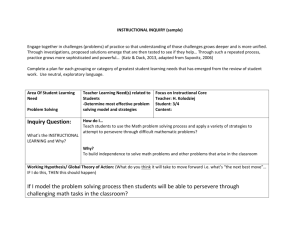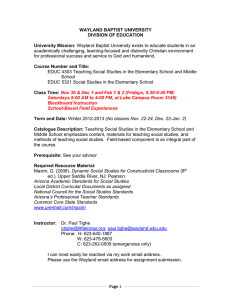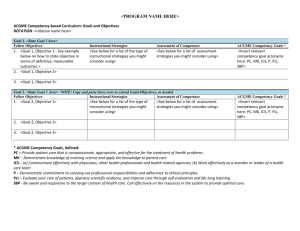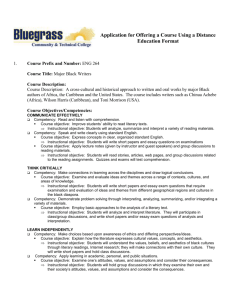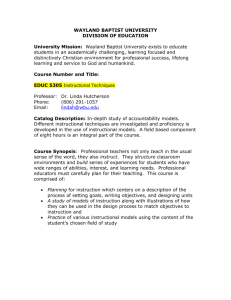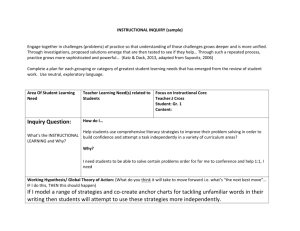academically challenging, learning-focused and distinctly Christian environment WAYLAND BAPTIST UNIVERSITY
advertisement
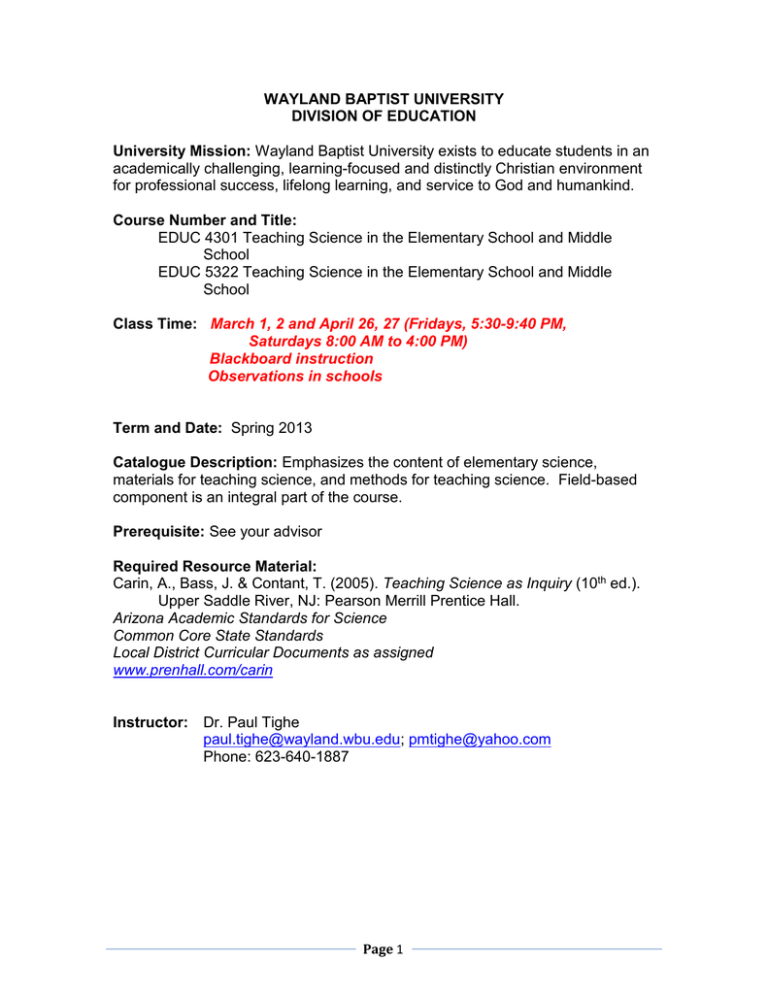
WAYLAND BAPTIST UNIVERSITY DIVISION OF EDUCATION University Mission: Wayland Baptist University exists to educate students in an academically challenging, learning-focused and distinctly Christian environment for professional success, lifelong learning, and service to God and humankind. Course Number and Title: EDUC 4301 Teaching Science in the Elementary School and Middle School EDUC 5322 Teaching Science in the Elementary School and Middle School Class Time: March 1, 2 and April 26, 27 (Fridays, 5:30-9:40 PM, Saturdays 8:00 AM to 4:00 PM) Blackboard instruction Observations in schools Term and Date: Spring 2013 Catalogue Description: Emphasizes the content of elementary science, materials for teaching science, and methods for teaching science. Field-based component is an integral part of the course. Prerequisite: See your advisor Required Resource Material: Carin, A., Bass, J. & Contant, T. (2005). Teaching Science as Inquiry (10th ed.). Upper Saddle River, NJ: Pearson Merrill Prentice Hall. Arizona Academic Standards for Science Common Core State Standards Local District Curricular Documents as assigned www.prenhall.com/carin Instructor: Dr. Paul Tighe paul.tighe@wayland.wbu.edu; pmtighe@yahoo.com Phone: 623-640-1887 Page 1 Attendance Policy: The University expects students to make class attendance a priority. All absences are to be explained to the instructor who will determine whether omitted work may be made up. When a student reaches the number of absences considered by the instructor to be excessive, the instructor will so advise the student and file an unsatisfactory progress report with the dean at the campus where the course is offered. Any student who misses 25% or more of the regularly scheduled class meetings will receive a grade of “F” in the course. Student appeals may be addressed, in writing, to the campus dean. Three times arriving late will equal one absence, and three times leaving class early will equal one absence. (Arrival more than five minutes late or departure more than five minutes early is deemed a late arrival/leave early.) Provisions for Special Needs: It is University policy that no otherwise qualified disabled person be excluded from participation in, be denied the benefits of, or be subject to discrimination under any educational program or activity in the University. Plagiarism Policy: Intellectual integrity and truthfulness are fundamental to scholarship. Plagiarism is a form of cheating. Plagiarism occurs when a student fails to give proper credit when information is either quoted or paraphrased or when a student takes credit for another person’s work. Plagiarism may result in an “F” in the course or expulsion from the class or the university. Course Outcome Competencies: See Arizona Teacher Standards. Course Requirements: It is very important for teachers to effectively communicate ideas to colleagues, parents, and administrators. Writing clear and error free English is a priority at Wayland’s Division of Education. Therefore, your ability to express your knowledge of educational concepts and theories within the conventions of academic discourse is assessed through both oral presentations and written assignments. Criteria for evaluation will be based on both content and mechanics. Integration of information from lectures, readings, discussions, and field experiences will be taken into consideration, as will correct and appropriate format and organization. Written work in this course must be prepared according to APA style. 1. The student will attend class, read all assigned materials, and participate in class activities/assignments (100 points). 2. The student will also be expected to participate in online Blackboard discussions (100 points). Students need to post substantial responses to each of seven weekly discussion questions. Each student will be required to read the responses posted by other students and post a substantive response to at least two other postings per week. A substantive response should be at least 200-300 words and reflect critical thoughts related to the original response posted. Page 2 Students are encouraged to also respond to the responses of other students, as an online discussion. 3. The student will visit during a Science lesson at an elementary/middle school. The visit should last at least two hours. A two to three page reflective summary of the experience will be expected (100 points). The summary should include information about the observation, interactions with students, as well as personal reactions to the visit. The student should reflect on things he/she would and would not incorporate in his/her classroom – and why. 4. The student will develop, prepare, present, and reflect on two Science lessons (100 points each). These lessons should each incorporate strategies from the text. At least one will incorporate a hands-on, inquiry-based strategy from the text. A two-page reflective summary of each experience will be expected. Each lesson will encompass a minimum of two hours of field experiences in the classroom. A total of eight hours of field experiences are required for the course. 5. The student will create a Science Unit (200 points). It should be a three-week unit plan for a grade level and a Science theme of the student’s choice. Separate guidelines and a planning template will be provided. 6. The student will electronically submit weekly online self-assessments to the instructor, based on assigned readings (100 points). Details will be provided in class. 7. The student will write a final reflection paper, approximately three pages in length, reflecting on course activities and learning experiences (100 points). Details will be provided in class during the second weekend. Grading: Assignment Class Attendance & Participation Blackboard Discussions Science Lesson Visit (field experience) Science Lesson Plan & Presentation 1 (field experience) Science Lesson Plan & Presentation 2 (field experience) Science Unit Plan & Presentation to Class Weekly Self-Assessments Final Reflection Paper Total Due Date 4 classes See calendar 3/23/13 4/6/13 Points 200 points 100 points 100 points 100 points 4/20/13 100 points 4/26/13 See calendar 4/27/13 200 points 100 points 100 points 1000 points Earned All assignments are due, as noted on course outline, unless otherwise announced in class or on Blackboard. Page 3 All assigned work must be word-processed. Assignments not completed on time will reflect a lowered grade of 10% deduction per day minimum. Late work will not be accepted after 7 days. If a student misses class the day an assignment is due, he or she must still turn in the assignment no later than the regular class meeting time to receive possible full credit for the assignment. University Grading Policy A = 90 – 100% B = 80 – 89% C = 70 – 79% D = 60 – 69% F = 0 – 59% Course Calendar Week 1: (2/25/13) Meeting 3/1/13 & 3/2/13 at Luke Campus Readings: Syllabus Text Appendix K Week 2: (3/4/13) Readings: Chapter 1: Children, Science, and Inquiry Chapter 2: Processes of Science and Scientific Inquiry Due: AZ Science Standards (select a grade level and download from www.ade.az.gov ) Discussion Question (DQ) 1 (due 3/6/13) Contact a school/teacher for field experiences (confirm by 3/8/13) Week 3: (3/11/13) Readings: Chapter 3: Learning Science with Understanding Chapter 4: Teaching Science Through Inquiry Due: DQ 2 (due 3/13/13) Self-Assessments (SA) Ch-1, 2 (due 3/16/13) Week 4: (3/18/13) Readings: Chapter 5: Questioning Strategies for Inquiry Teaching Chapter 6: Assessing Science Learning Due: DQ 3 (due 3/20/13) SA Ch-3, 4 (due 3/23/13) Classroom Visit Reflective Summary (due 3/23/13) Page 4 Week 5: (3/25/13) Readings: Chapter 7: Preparing for Inquiry Instruction Chapter 8: Connecting Science with Other Subjects Due: DQ 4 (due 3/27/13) SA Ch-5, 6 (due 3/30/13) Week 6: (4/1/13) Readings: Chapter 9: Science for All Learners Chapter 10: Educational Technology and the Science Curriculum Due: DQ 5 (due 4/3/13) SA Ch-7, 8 (due 4/6/13) Science Lesson 1 Summary (due 4/6/13) Week 7: (4/8/13) Readings: Text Activities Section I: Teaching Inquiry Science Activities Text Activities Section II: Physical Science Activities Due: DQ 6 (due 4/10/13) SA Ch-9, 10 (due 4/13/13) Week 8: (4/15/13) Readings: Text Activities Section III: Life Science Activities Text Activities Section IV: Earth and Space Science Activities Due: DQ 7 (due 4/17/13) Science Lesson 2 Summary (due 4/20/13) Week 9: (4/22/13) Meeting 4/26/13 & 4/27/13 at Luke Campus Readings: Text Activities Section IV: Earth and Space Science Activities Due: Science Unit and Presentation to Class (due 4/26/13) Final Reflection Paper (due 4/27/13) Page 5 Texas Examinations of Educator Standards (TExES) Alignment #100: Pedagogy and Professional Responsibilities EC-4 Preparation Manual: The beginning teacher: Domain 1: Designing Instruction and assessment to promote student learning Competency 001: The teacher understands human development processes and applies this knowledge to plan instruction and ongoing assessment that motivate students and are responsive to their developmental characteristics and needs. (1.3 refers to Competency 001, bullet 3. Point snot listed appear in other courses.) 1.3 Recognizes the wide range of individual developmental differences that characterizes students in early childhood through grade 4 and the implications of this developmental variation for instructional planning. 1.7 Demonstrates knowledge of developmental changes in children’s thinking (i.e., from primarily concrete thinking to the ability to reason and think logically, to understand cause and effect, and to organize information systematically). 1.10 Uses knowledge of the developmental characteristics and needs of students in early childhood through grade 4 to plan meaningful, integrated, and active learning and play experiences that promote the development of the whole child. Competency 002: The teacher understands student diversity and knows how to plan learning experiences and design assessments that are responsive to differences among students and that promote all students’ learning. 2.5 Knows how to plan and adapt lessons to address students’ varied backgrounds, skills, interests, and learning needs, including the needs of English Language Learners and students with disabilities. 2.6 Understands cultural and socioeconomic differences (including differential access to technology) and knows how to plan instruction that is responsive to cultural and socioeconomic differences among students. Competency 003: The teacher understands procedures for designing effective and coherent instruction and assessment based on appropriate learning goals and objectives. 3.1 Understands the significance of the Texas Essential Knowledge and Skills (TEKS) and of prerequisite knowledge and skills in determining instructional goals and objectives. 3.2 Uses appropriate criteria to evaluate the appropriateness of learning goals and objectives (e.g., clarity; relevance; significance; age-appropriateness; ability to be assessed; responsiveness to students’ current skills and knowledge, background, needs and interests; alignment with campus and district goals). 3.3 Uses assessment to analyze students’ strengths and needs, evaluate teacher effectiveness, and guide instructional planning for individuals and groups. 3.5 Demonstrates knowledge of various types of materials and resources (including technological resources and resources outside the school) that may be used to enhance student learning and engagement, and evaluates the appropriateness of specific materials and resources for use in particular situations, to address specific purposes and to meet varied student needs. 3.6 3.7 3.8 Plans lessons and structures units so that activities progress in a logical sequence and support stated instructional goals. Plans learning experiences that provide students with opportunities to explore content from integrated and varied perspectives (e.g., by presenting thematic units that incorporate different disciplines, grouping students in study teams, providing multicultural learning experiences, prompting students to consider ideas from multiple viewpoints). Plans lessons and structures units so that activities progress in a logical sequence and support stated instructional goals. Page 6 Competency 004: The teacher understands learning processes and factors that impact student learning and demonstrates this knowledge by planning effective, engaging instruction and appropriate assessments. 4.8 Recognizes how social and emotional characteristics of middle-level students (e.g., interacting with peers, searching for identity, questioning principles and expectations) impact teaching and learning. 4.9 Analyzes ways in which teacher behaviors (e.g., teacher expectations, student grouping practices, teacher-student interactions) impact student learning and plans instruction and assessment that minimize the effects of negative factors and enhance all students’ learning. 4.10 Analyzes ways in which factors in the home and community (e.g., parent expectations, availability of community resources, community problems) impact student learning, and plans instruction and assessment with awareness of social and cultural factors to enhance all students’ learning. Domain II: Creating a positive, productive classroom environment Competency 006: The teacher understands strategies for creating an organized and productive learning environment and for managing student behavior. 6.2 Applies procedures for organizing and managing groups to ensure that students work together cooperatively and productively in various settings (e.g., problemsolving teams, group projects, research groups, skits, student-centered multimedia presentations. Domain III: Implementing effective, responsive instruction and assessment Competency 007: The teacher understands and applies principles and strategies for communicating effectively to varied teaching and learning contexts. 7.2 Engages in skilled questioning and leads effective student discussions, including using questioning and discussion to engage all students in exploring content; extends students’ knowledge; and fosters active student inquiry, higher-order thinking, problem solving, and productive, supportive interactions, including appropriate wait time. 7.3 Communicates directions, explanations and procedures effectively and uses strategies for adjusting communication to enhance student understanding (e.g., by providing examples, simplifying complex ideas, using appropriate communication tools). Competency 008: The teacher provides appropriate instruction that actively engages students in the learning process. 8.1 Employs various instructional techniques (e.g., discussion, inquiry) and varies teacher and student roles in the instructional process, and provides instruction that promotes intellectual involvement and active student engagement and learning. 8.2 Applies various strategies to promote student engagement and learning (e.g., by structuring lessons effectively, using flexible instructional groupings, pacing lessons flexibly in response to student needs, including wait time). 8.3 Presents content to students in ways that are relevant and meaningful and that link with students’ prior knowledge and experience. 8.4 Applies criteria for evaluating the appropriateness of instructional activities, materials, resources, and technologies for students with varied characteristics and needs. 8.5 Engages in continuous monitoring of instructional effectiveness. 8.6 Applies knowledge of different types of motivation (i.e., internal, external) and factors affecting student motivation. 8.7 Employs effective motivational strategies and encourages students’ self-motivation. Competency 010: The teacher monitors student performance and achievement; provides students with timely, high-quality feedback; and responds flexibly to promote learning for all students. 10.1 Demonstrates knowledge of the characteristics, uses, advantages, and limitation of various assessment methods and strategies, including technological methods and methods that reflect realworld applications. Page 7 TExES #101: Generalist EC-4 Preparation Manual: The beginning teacher: Domain 1: English Language Arts and Reading Competency 008: Research and comprehension skills in the content areas: The teacher understands the importance of research and comprehension skills to children’s academic success and provides children with instruction that promotes their acquisition and effective use of these skills in the content areas. 8.3 Selects and uses instructional strategies, materials, and activities to help children use graphics (e.g., tables, charts, maps, diagrams, timelines) and other sources of information and technologies to acquire information. 8.5 Selects and uses instructional strategies, materials, and activities to help children use multiple sources (e.g., by taking notes, outlining, creating graphic organizers). 8.6 Understands how to foster collaboration with families and with other professionals to promote all children’s ability to develop effective research and comprehension skills in the content areas. Domain IV: Science Competency 020 Science instruction: The teacher uses knowledge of science content and methods to plan effective, engaging, and safe instruction and to assess learning. 20.1 Designs and adapts curricula and selected science content to address the interests, knowledge, abilities, experiences, and needs of all children. 20.2 Plans and implements instruction that prompts children’s engagement in processes of scientific inquiry (e.g., asking a scientific question; formulating a testable hypothesis; selecting appropriate equipment and technology to gather information related to the hypothesis; making observations and collecting data; organizing, analyzing, and evaluating data to find data trends and patterns and make inferences; communicating and defending a valid conclusion). 20.3 Uses situations from children’s daily lives to develop instruction that investigates how science can be used to make informed decisions. 20.4 Creates, implements, and enforces rules and safety procedures to promote and maintain a safe learning environment during laboratory and field activities. 20.5 Provides laboratory space and equipment for all students, including those with special needs. 20.6 Designs science instruction that includes the contributions of individuals from a variety of cultures. 20.7 Promotes children’s understanding that scientific ideas and explanations must be consistent with observational and experimental evidence. 20.8 Uses a variety of formal and informal assessments and knowledge of the Texas Essential Knowledge and Skills (TEKS) in science to determine children’s progress and needs and to help plan instruction for individual children, including English Language Learners. 20.9 Develops procedures for assessing child participation in and understanding of the inquiry process. 20.10 Understands the implications of stages of child growth and development for designing and implement in effective learning experiences in science and selects effective, developmentally appropriate instructional practices, activities, technologies, and materials to promote children’s scientific knowledge and skills. Page 8
